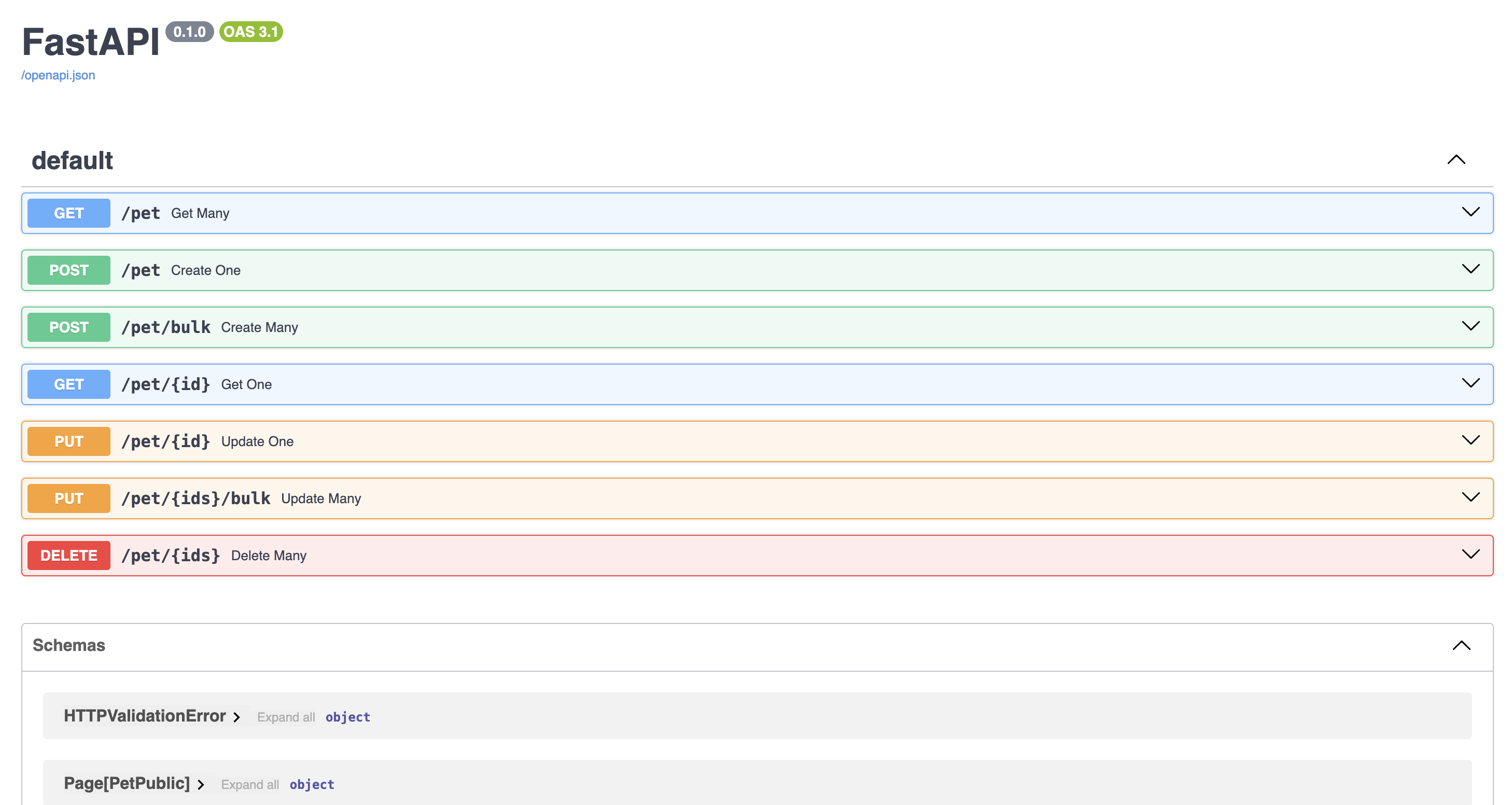A better CRUD library for FastAPI.
FastAPI CRUD routing library based on class view, you can control everything
Documentation: https://bigrivi.github.io/better_crud/
Source Code: https://github.com/bigrivi/better_crud
BetterCRUD is a library that can quickly generate CRUD routes for you without any intrusion to your code. You can still control everything. When you are troubled by a large number of repeated CRUD routes, I believe it can help you, saving you a lot of time and allowing you to focus more on business logic.
BetterCRUD is reliable, fully tested, and used in project production environments.
BetterCRUD is a way to dynamically generate routes by combining your model with the crud decorator,I believe bring you a different development experience
You only need to configure some crud options and define your model to produce powerful CRUD functions
@crud(
router,
dto={
"create": PetCreate,
"update": PetUpdate
},
serialize={
"base": PetPublic,
},
**other_options
)
class PetController():
service: PetService = Depends(PetService)- Python: Version 3.9 or newer.
- FastAPI: BetterCRUD is built to work with FastAPI, so having FastAPI in your project is essential.
- SQLAlchemy: Version 2.0.30 or newer. BetterCRUD uses SQLAlchemy for database operations.
- Pydantic: Version 2.7.3 or newer. BetterCRUD leverages Pydantic models for data validation and serialization.
pip install better-crud- Fully Async, Synchronization is not supported
- Less boilerplate code
- Configuring static type support
- More flexible custom configuration,Less invasive
- Compatible with both class views and functional views
- Rich filter, pagination, and sorting support
- Automated relationship support, query and storage
- Extensible custom backend
| Route | Method | Description |
|---|---|---|
| /resource | GET | Get Many |
| /resource/{id} | GET | Get One |
| /resource | POST | Create One |
| /resource/bulk | POST | Create Many |
| /resource/{id} | PUT | Update One |
| /resource/{ids}/bulk | PUT | Update Many |
| /resource/{ids} | DELETE | Delete Many |
Prerequisites,Prepare our db, Only asynchronous mode is supported,aiomysql or aiosqlite db.py
from sqlalchemy.orm import DeclarativeBase, declared_attr
from typing import AsyncGenerator
from sqlalchemy.orm import sessionmaker
from sqlalchemy.pool import NullPool
from sqlalchemy.ext.asyncio import AsyncSession, create_async_engine
DATABASE_URL = "sqlite+aiosqlite:///crud.db"
class MappedBase(DeclarativeBase):
@declared_attr.directive
def __tablename__(cls) -> str:
return cls.__name__.lower()
class Base(MappedBase):
__abstract__ = True
engine = create_async_engine(
DATABASE_URL,
echo=False,
poolclass=NullPool
)
SessionLocal = sessionmaker(
autocommit=False,
autoflush=False,
bind=engine,
class_=AsyncSession,
expire_on_commit=False,
)
async def get_session() -> AsyncGenerator[AsyncSession, None]:
async with SessionLocal() as session:
yield session
async def init_db():
async with engine.begin() as conn:
await conn.run_sync(MappedBase.metadata.create_all)First Define Your Model And Schema
model.py
from sqlalchemy import String, Integer, ForeignKey
from sqlalchemy.orm import Mapped, mapped_column
from .db import Base
class Pet(Base):
__tablename__ = "pet"
id: Mapped[int] = mapped_column(Integer, primary_key=True)
name: Mapped[str] = mapped_column(String(100))
description: Mapped[str] = mapped_column(String(100))schema.py
from typing import Optional, List
from pydantic import BaseModel
class PetBase(BaseModel):
name: Optional[str] = None
description: Optional[str] = None
class PetPublic(PetBase):
id: int
class PetCreate(PetBase):
pass
class PetUpdate(PetBase):
passNext we need to create a service:
service.py
from better_crud.service.sqlalchemy import SqlalchemyCrudService
from .model import Pet
class PetService(SqlalchemyCrudService[Pet]):
def __init__(self):
super().__init__(Pet)Next we need to define the controller and decorate it with the crud decorator Sure the controller is just a normal class,The crud decorator gives it super powers controller.py
from fastapi import APIRouter, Depends
from better_crud import crud
from .schema import PetCreate, PetUpdate, PetPublic
from .service import PetService
pet_router = APIRouter()
@crud(
pet_router,
dto={
"create": PetCreate,
"update": PetUpdate
},
serialize={
"base": PetPublic,
}
)
class PetController():
service: PetService = Depends(PetService)Next we can register router to the fastapi routing system
main.py
from better_crud import BetterCrudGlobalConfig
from fastapi import FastAPI
from contextlib import asynccontextmanager
from .db import get_session, init_db
BetterCrudGlobalConfig.init(
backend_config={
"sqlalchemy": {
"db_session": get_session
}
}
)
@asynccontextmanager
async def lifespan(_: FastAPI):
await init_db()
# Shutdown
yield
app = FastAPI(lifespan=lifespan)
def register_router():
from app.controller import pet_router
app.include_router(pet_router, prefix="/pet")
register_router()
Congratulations, your first CRUD route has been created!
👤 bigrivi
- GitHub: bigrivi
Contributions are what make the open source community such an amazing place to learn, inspire, and create. Any contributions you make are greatly appreciated.
If you have a suggestion that would make this better, please fork the repo and create a pull request. You can also simply open an issue with the tag "enhancement". Don't forget to give the project a star! Thanks again!
- Fork the Project
- Create your Feature Branch (
git checkout -b feature/AmazingFeature) - Commit your Changes (
git commit -m 'Add some AmazingFeature') - Push to the Branch (
git push origin feature/AmazingFeature) - Open a Pull Request
This project draws inspiration from the following frameworks:


